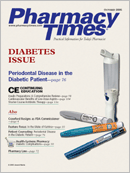Publication
Article
Pharmacy Times
A Pharmacist's Guide to OTC Therapy: Diabetic Nutritional Supplements
Author(s):
A variety of nutritional supplements are available to address the nutritional needs of the growing diabetic population (Table). The supplements can aid patients with diabetes in adding essential nutrients to their diets when they are not able to obtain an adequate intake of these nutrients through routine dietary measures. These supplements can be used in conjunction with a diet or as a meal replacement when necessary.
According to the American Pharmacists Association's Handbook of Nonprescription Drugs, diabetic formulas are designed for individuals with glucose intolerance. These formulas use reduced carbohydrate calories (34%- 40% carbohydrates) and increased fat calories (45%-50% fat calories) to assist glycemic control. The resulting fat concentrations are typically higher than those recommended by the American Diabetes Association2:
Some studies suggest that certain nutrients can aid individuals in the management of diabetes. These nutrients include the following2:
- Arginine?this nutrient helps to improve insulin sensitivity and promotes wound healing
- Vitamins C and E?these antioxidants may be beneficial in reducing increased levels of free radicals that can lead to oxidative tissue damage. Decreased levels of antioxidants are common in diabetics. Vitamin E also may decrease low-density lipoprotein oxidation.
- Chromium?this nutrient can aid in glycemic control through regulation of insulin action. Chromium deficiency can lead to glucose intolerance and insulin resistance.
The Role of the Pharmacist
Specialized formulas, such as those for diabetics, should be used only under medical supervision. Pharmacists should screen all patients for potential contraindications and/or drug-drug interactions, especially those on anticoagulant therapy, because many nutritional supplements contain vitamin K.
Pharmacists also can assist patients with diabetes management by (1) counseling them about pharmacologic therapies and (2) encouraging them to seek the advice of their health care provider to devise a diet that is tailored to meet their individual needs. In addition, pharmacists need to reinforce the importance of diabetic patients taking an active role in positively impacting the management of their condition. Thus they can reduce the incidence of further complications.
Ms. Terrie is a clinical pharmacy writer based in the northern Virginia area.
For a list of references, send a stamped, self-addressed envelope to: References Department, Attn. A. Stahl, Pharmacy Times, 241 Forsgate Drive, Jamesburg, NJ 08831; or send an e-mail request to: [email protected].







